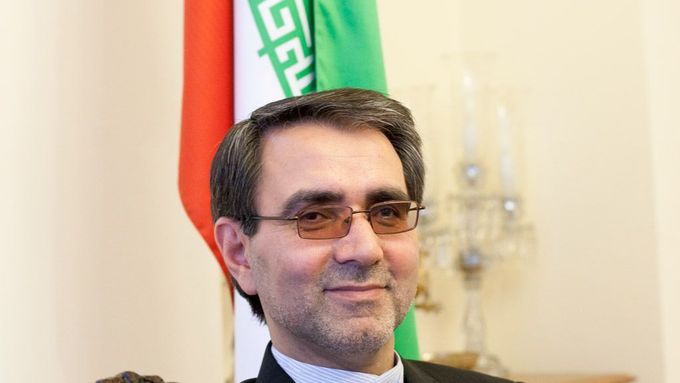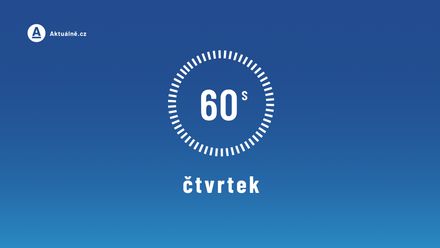Prague - Aktualne.cz spoke to Mr. Gholam Reza Derikvand, charge d'affaires of the Islamic Republic of Iran in Prague, about the ongoing talks with the USA and other Western powers, civil war in Syria, opposition group People's Mujahedeen of Iran (MEK), and Iran's relations with the Czech Republic and Czech President Milos Zeman.
Aktualne.cz.: In Geneva, Iran signed a preliminary agreement with the United States and other powers to settle the dispute related to Iran's nuclear program. So some economic sanctions against your country will be lifted. Is it a historical agreement, a turning point in relations between the USA and Iran after years of hostility?
Gholam Reza Derikvand: It could be the case. However, it depends on many factors. It is not a matter of one or two days or one or two months. The illegal sanctions imposed on us by the United States and EU affected mainly ordinary people. Those who claim to support the observation of human rights thus violate them themselves.
Nevertheless, we hope that the talks on a permanent agreement will be successful. Certainly there are different views and it cannot be expected that there will be no opposition to the agreement, in the United States, in Europe and also in Iran. Even in Iran there are different voices. There could be people - in or outside the parliament - who reject and criticize the agreement. Like some politicians in the American Congress. However, at the moment it seems that all sides really wish to achieve an agreement. Of course, the implementation of the agreement is based on the reciprocal behavior of all sides. By the way, the new round of negotiations is under way in Vienna these days, therefore we hope there will be more progress.
Recently there has been some information about contacts between some Czech politicians and the exile opposition group People's Mujahedeen of Iran (MEK), considered by your government a terrorist organization. One of these politicians was for example Culture Minister Mr. Herman, who reportedly met with the group's representatives before becoming minister. Is this a serious matter to you?
The People's Mujahedeen (MEK) were recently removed from the American and European lists of terrorist organizations, however this move does not reflect the true situation. It is a sectarian organization that has been engaged in terrorist activities since 1980. In Iran they have killed thousands of people and have done the same in Iraq. (Editor's note: In 1980, the People's Mujahedeen fought the government of Ayatollah Khomeini and established their bases in Iraq).We consider it very dangerous that anybody accepts this group. As for the supposed meetings between Czech personalities and representatives of this organization, then according to my information they were misinformed beforehand about who they would meet.
The People's Mujahedeen are very active in establishing contacts all over Europe, they are focusing especially on deputies of various European parliaments. They are very active in Brussels, Paris, Rome and elsewhere. To my knowledge, the Czech personalities who allegedly met with the MEK did not have the correct information about the real character of this organization, whose representatives have repeatedly tried to approach various people in Prague, influential people. Fortunately, they failed in their attempts.
Let me point out that in Iran, the MEK is one of the most hated organizations. In the 1980s, during the time of the war that was imposed on Iran, they stood on the side of Saddam Hussein. They supported him in murdering Iranians and destroying Iranian cities and infrastructure.
Czech President Zeman is known as a big ally of Israel. He has even made some, let's say, anti-Palestinian or anti-Muslim remarks. Obviously, such an attitude does not help to build an understanding between Prague and Tehran, am I correct?
Everybody can have their own views on various matters. So far, we have not noticed any serious negative attitudes towards Iran. Since the start of his presidency, we haven't had any problem with the Czech Republic and we have not heard, as I said, any negative comments related to Iran. As for the relations of the Czech Republic and its politicians with other countries, we do not want to interfere with that. This is the matter of the Czech state and the Czech Government. What matters are the relations between the Czech Republic and Iran. And I will do my best to make them good.
Do you think Barack Obama is , let's say, more realistic on the Middle East then his predecessors? I am referring to the fact that this kind of agreement was signed with Iran…
President Obama started his term in office more then five years ago. During that period, the American policy in the Near East has had several faces and tried several approaches. I would say that to a certain extent, Obama and his advisers learned lessons from past mistakes. Step by step they recognize the importance of respecting the views and the will of the people and to know the real situation in the region.
I would use Syria as an example. A year ago, some people in the American administration urged Obama to take a military action against Syria, fortunately he did not make such a mistake. Because, if he had done so, it would have been a big catastrophe for Syria and the whole region and for global security in general. The war and the use of force are not a good solution for such problems in the region. And I think the American president is gradually learning such an attitude.
In the last decade, the Czech-Iranian relations were rather cooled down. Was it because the existence of the exile Radio Farda financed by the United States and broadcasting from Prague? Has this problem been overcome or is this station still a matter of concern for your country?
To be honest, in the beginning this radio really caused a problem and misunderstanding in the relations between the two countries. However, this station and its website do not play an essential role in Iran. There are tens and even hundreds of similar websites, radios or TV stations. Radio Farda is among those receiving little attention.
But let me disagree with you that our relations were in some way considerably cooled down. It is true that the diplomatic representation was downgraded (Editor's note: Iran does not have an ambassador in the Czech Republic, only a charge d'affaires). Even though the broadcast of Radio Farda was launched in 1997, the economic relations have developed in some years since then.
In 2012, in the group of countries of the Northern, Central and Eastern Europe, the Czech Republic was Iran's third biggest business partner after Sweden and Denmark. Let's not forget that the diplomatic relations between Prague and Tehran date back to 1922, therefore many Czechoslovak and Czech companies have a long tradition in Iran.
You say that an American attack on Syria would produce a catastrophe. However, after three years of civil war, a catastrophe of sorts has already happened. Your government is one of the allies of President Bashar Assad. Do you agree that he should share a part of the blame for the violence in Syria?
Syria ranks among our friends, since the days of the rule of Hafez Assad, and this relation continues also during the rule of Bashar Assad. Syria is simply one of our friends and it makes no sense to claim anything else. As for the current crisis in the country - those thousands of dead - the major cause of that is the support to terrorists who are active in Syria by some countries from the region and outside.
I wanted to ask something different. Do you think that the government of Assad can also be blamed for what's going on there?
Let me explain. Until recently, a majority of countries participating in the Geneva conference were in favor of a military action against Syria. And they support mainly terrorist groups which raised arms against the legal government. EU citizens are also among them. These terrorists murder and massacre. Some countries in the region or outside support these terrorist groups. Now they are even fighting one another.
It is impossible to bring democracy to any country by supporting the most dangerous terrorist groups. The reality is that a majority of countries did not pay attention to the growth of the number of terrorists in Syria.
Our country supports humanitarian, not military aid. We are in favor of respecting the will of Syrians. Assad's government is legal and elected. It did not come to power in a coup like some other countries in the region. It is up to Syrians themselves to decide their future. No one has the right to dictate them what to do and who to elect.
Follow us on Twitter!








